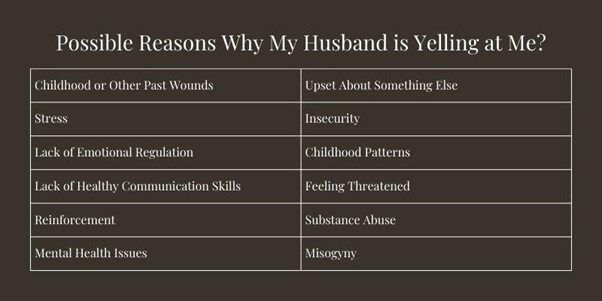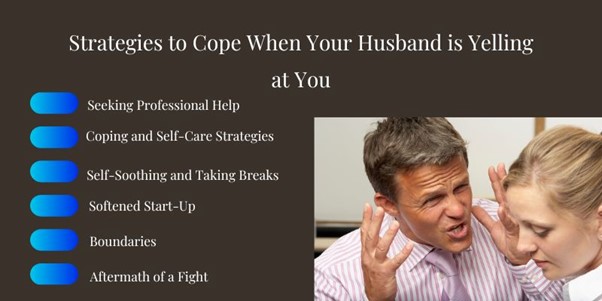Why Is My Husband Yelling at Me?
If your husband is yelling at you, it can be hurtful and confusing. You might wonder why it’s happening and what you can do about it.
Yelling in a relationship, especially when it becomes a pattern, can signify deeper issues like stress, poor communication, or unresolved anger.
While everyone has arguments from time to time, constant yelling can lead to emotional distress and even affect your mental health and leave you wondering, “why is my husband yelling at me”.
In the U.S., nearly 1 in 3 women experience some form of emotional or verbal abuse in their lifetime, according to the National Coalition Against Domestic Violence (NCADV).
Yelling is often a part of this type of abuse, even if it doesn’t involve physical harm.
The effects of emotional abuse can be just as damaging, leaving you feeling anxious, isolated, and unsure of how to fix things.
It’s important to know that you’re not alone and that help is available. Understanding why your husband yells is the first step in addressing the problem.
It could be due to his own frustrations, past trauma, or a lack of healthy communication tools.
However, it’s also essential to set boundaries and seek support when needed, whether from a therapist, friends, or domestic violence hotlines.
In this blog, we’ll explore the reasons behind yelling in relationships, how to handle it, and when to seek professional help.
12 Best Possible Reasons Why My Husband is Yelling at Me?

When your husband yells at you, it can feel overwhelming, and you might wonder what’s causing this behavior. Yelling often expresses anger or frustration but can also respond to deeper, underlying issues.
While not every instance of yelling means something seriously wrong, frequent or intense outbursts could point to unresolved personal struggles or external stress.
Recognizing these reasons can help you better understand what’s happening and guide you toward solutions prioritizing healthy communication.
Let’s explore common reasons that could be contributing to his yelling:
1. Childhood or Other Past Wounds

Sometimes, people carry unresolved pain from their past into their current relationships.
If your husband experienced a difficult childhood, trauma, or emotional neglect, he might have learned to express his feelings through anger rather than calm communication.
For example, growing up in a household where yelling was normal may have conditioned him to see it as a typical way to express frustration.
Unresolved wounds from past relationships, whether romantic or not, can also lead to feelings of insecurity, anxiety, or anger, which may surface as yelling during conflicts.
If this is the case, it’s essential to approach the situation with empathy and encourage him to seek help, such as therapy, to work through these deeper anger issues.
Healthy communication patterns can replace the unhealthy ones that stem from past wounds.
2. Upset About Something Else

Another reason your husband might yell is that he’s upset about something entirely unrelated to you.
Stress from work, financial pressures, or personal challenges can make people more irritable. In these situations, the frustration from external problems builds up.
It may come out as yelling during an argument at home. He might be struggling with his emotions and taking them out on the nearest person, who is often a spouse.
Understanding this doesn’t excuse the behavior but helps explain why it’s happening.
Encourage open conversations about what’s bothering him and suggest finding healthy ways to cope with stress, such as relaxation techniques or even seeking professional help if the stress is overwhelming.
3. Stress

Stress is a common trigger for yelling in relationships. When your husband feels overwhelmed by life’s demands, he may lash out at you to release the pressure.
Stress can affect how someone reacts to situations, making small disagreements feel like bigger problems than they are.
Unfortunately, instead of talking about what’s bothering him, he may resort to yelling as a quick way to express frustration.
When stress is the cause, it’s essential to recognize that it’s not about you but his inability to manage his emotions in the moment.
Encouraging open communication and finding ways to reduce stress together can make a difference.
Simple activities like taking time for relaxation, exercising, or even seeking professional advice can help.
Setting boundaries around how stress is handled in your relationship is essential, so yelling doesn’t become the norm.
4. Insecurity

Insecurity can also lead to yelling, especially if your husband feels threatened or inadequate in some aspect of his life.
He might fear losing control, being judged, or not being “good enough,” these feelings can trigger angry outbursts.
For example, if he perceives that you’re criticizing him (whether about his job, appearance, or choices), his insecurity may cause him to react defensively, often through yelling.
When insecurity is at the root of the issue, it’s essential to approach the situation with patience and honesty.
Reassurance can help, but it’s also necessary to encourage him to explore these feelings.
Therapy or open discussions about self-worth and confidence may help him build a stronger emotional foundation and develop healthier ways to respond to feelings of inadequacy.
5. Lack of Emotional Regulation
Yelling can also be a sign that your husband struggles with emotional regulation.
Some people have difficulty managing strong emotions like anger or frustration, and without the right tools, they might resort to yelling as an outlet.
This could be due to a lack of emotional awareness, where they don’t fully understand how to express their feelings constructively.
It could also stem from never having learned how to handle emotions healthily, which is common in families where emotional outbursts are normalized.
When emotional regulation is the issue, it’s essential to recognize that learning how to manage emotions is a skill that can be developed.
Encouraging your husband to seek therapy or counseling to work on these skills can lead to healthier communication.
Mindfulness practices, anger management techniques, and emotional awareness exercises are all strategies that can help him gain better control over his responses, reducing the likelihood of yelling as a form of expression.
6. Childhood Patterns

Yelling may be a behavior your husband learned during childhood. Children absorb and internalize the dynamics they see between their parents or caregivers.
If yelling is common, it becomes a learned response when faced with stress or disagreements. As adults, they may continue this behavior without realizing its impact.
This doesn’t mean that people can’t change. Recognizing childhood patterns can help break the cycle.
Talking to him about the importance of finding new strategies and encouraging him to reflect on how his upbringing affects his current behavior can be a helpful first step.
7. Lack of Healthy Communication Skills
Some people yell because they simply lack the tools to communicate effectively. If your husband struggles with expressing his thoughts and emotions constructively, yelling might feel like the only option when things get tense.
He may not have learned how to deal with difficult conversations calmly or resolve disagreements without raising his voice.
Improving communication skills can make a huge difference. Encourage him to practice active listening, where you both focus on hearing each other’s perspectives before responding.
Couples counseling or communication workshops can also help you build better skills, enabling you to have conversations without yelling.
Healthy communication requires practice, but the right tools can transform how you both handle conflicts.
8. Feeling Threatened

Feeling threatened whether physically, emotionally, or psychologically can trigger yelling as a defensive reaction.
If your husband feels like his authority, self-esteem, or position in the relationship is being challenged, he may respond by raising his voice to assert dominance or defend himself.
This is often linked to fear of losing control or being vulnerable, which may not always be obvious on the surface.
For example, if he feels criticized or believes you’re questioning his abilities, he may yell to protect his ego or avoid feeling inadequate.
If this is the underlying cause, addressing the root of these feelings is essential. Open communication about what makes him feel threatened and how you can create a safer emotional environment is key.
9. Reinforcement
Reinforcement happens when yelling achieves the desired outcome, whether it’s gaining attention, avoiding conflict, or simply getting their way.
Over time, if your husband has found that raising his voice leads to results (such as ending an argument quickly or controlling the situation), he may continue this behavior because it works for him.
This reinforcement makes yelling a go-to response whenever tension arises, creating a cycle that’s hard to break.
To address this, it’s essential to stop reinforcing the behavior. Instead of engaging or backing down when he yells, set boundaries around how you’ll respond to shouting.
Calmly explain that yelling is unacceptable and refuse to engage in the conversation until it can be done respectfully.
By not rewarding the behavior with compliance or attention, you can help break the reinforcement cycle.
10. Substance Abuse

Substance abuse can significantly alter a person’s behavior, and yelling may be one of the side effects.
Alcohol, drugs, or other substances can impair emotional regulation and lower inhibitions, making it easier for someone to lose their temper or lash out.
If your husband is dealing with substance abuse, he may struggle to control his emotions, and yelling could become more frequent or intense during moments of intoxication or withdrawal.
Substances can exacerbate underlying issues like stress, anxiety, or insecurity, leading to more aggressive reactions.
If substance abuse is contributing to the yelling, it’s critical to address the root problem.
Encourage your husband to seek professional help, whether through therapy, rehabilitation programs, or support groups like Alcoholics Anonymous (AA) or Narcotics Anonymous (NA).
Substance abuse not only affects emotional control but can also damage relationships, so finding the right resources for treatment is key.
It’s also essential to protect your own well-being during this process, ensuring that you’re not subjected to ongoing emotional harm due to his substance use.
11. Mental Health Issues

Mental health issues such as depression, anxiety, bipolar disorder, or PTSD can contribute to frequent yelling.
If your husband is struggling with an undiagnosed or untreated mental health condition, he may have difficulty managing his emotions, leading to outbursts of anger or frustration.
Mental health disorders can amplify feelings of stress, irritability, or emotional instability, and yelling becomes a way to release these pent-up emotions.
In some cases, untreated mental health issues may cause mood swings or increased sensitivity to stress, making small issues feel overwhelming.
If you suspect mental health is a factor, it’s essential to approach the situation with understanding while encouraging him to seek professional help.
Therapy, counseling, or medication can help manage symptoms and provide tools to better regulate emotions.
Offering support while setting boundaries is key – his mental health struggles do not excuse harmful behavior, but understanding the root cause can open the door to meaningful solutions.
A mental health professional can work with him to find healthier ways to manage stress and communicate more effectively.
12. Misogyny
Misogyny, or ingrained prejudice against women, can also lead to yelling in relationships.
If your husband holds sexist beliefs or feels entitled to control or dominate you, yelling may be a tactic used to exert power or assert authority.
Misogyny can manifest as a sense of superiority, where he believes he has the right to speak down to you or demand things in a way that diminishes your voice.
This behavior often comes from societal conditioning, cultural influences, or personal beliefs devaluing women’s opinions and autonomy.
If misogyny is at play, it’s crucial to address this harmful mindset head-on.
Open conversations about respect, equality, and fairness in the relationship are necessary, but deeper change often requires self-reflection and, in many cases, professional help.
Misogynistic behaviors are deeply rooted and may not change without confronting these beliefs through therapy or counseling.
You should also prioritize your safety and emotional health, and if the behavior continues or worsens, consider seeking outside support from friends, family, or professionals to ensure your well-being.
Strategies to Cope When Your Husband is Yelling at You

When your husband is yelling, finding healthy ways to cope with the situation is essential. While yelling can make you feel overwhelmed, scared, or even angry yourself, reacting emotionally can escalate the problem further.
It’s essential to focus on strategies that protect your emotional well-being while addressing the root cause of the yelling.
This could involve seeking outside help, setting clear boundaries, or developing self-care routines to handle the emotional toll.
The key is to ensure that yelling doesn’t become a regular or acceptable part of your relationship dynamic.
Below are key strategies that can help you manage these situations:
1. Seeking Professional Help
Seeking professional help, such as couples counseling therapy, can be useful when yelling has become a pattern in your relationship.
Therapy provides a safe space for both of you to discuss underlying issues and learn how to communicate more effectively.
A trained therapist can help identify triggers for the yelling, whether from stress, emotional wounds, or other personal issues.
In couples counseling, you’ll work together to find healthier ways to express frustration and resolve conflicts, reducing the need for yelling.
Counseling also encourages both partners to reflect on their behaviors, improving emotional awareness and offering tools for better communication.
If your husband is willing to engage in this process, it can significantly change your relationship.
However, if he’s resistant, individual therapy for yourself can also help you analyze the situation, set boundaries, and prioritize your emotional well-being.
2. Coping and Self-Care Strategies
In addition to seeking professional help, focusing on self-care is essential when dealing with a partner who yells.
Yelling can take a toll on your mental and emotional health, making it crucial to have coping strategies that allow you to manage the stress.
Practicing mindfulness, meditation, or deep-breathing exercises can help you stay calm in the moment and avoid reacting with anger or frustration yourself.
Self-care also means protecting your emotional boundaries. Remembering yourself that your partner’s yelling is not your fault and doesn’t define your worth is essential.
Finding time to engage in activities that bring you peace and joy, like reading, exercising, or spending time with friends, helps maintain emotional balance.
These strategies allow you to recharge and strengthen your resilience, helping you better handle difficult moments in your relationship while safeguarding your well-being.
3. Self-Soothing and Taking Breaks
Feeling overwhelmed, anxious, or even scared is easy when faced with yelling. One effective coping strategy is self-soothing, which involves calming yourself down during or after a heated moment.
Techniques such as deep breathing, counting to ten, or repeating calming phrases can help manage the emotional flood caused by someone yelling at you.
Grounding exercises, like focusing on physical sensations (touch, smell, sound), can also redirect your mind and reduce stress.
Taking a break during an argument is equally important. If your husband is yelling and you feel things are escalating, calmly explain that you must step away to cool down.
This break gives you time to collect your thoughts and helps prevent the situation from escalating further.
Walking away from a heated exchange isn’t about ignoring the issue but asking for space to approach the conversation more calmly later.
4. Softened Start-Up
A softened start-up is a communication technique that helps prevent yelling and conflicts from spiraling out of control.
Instead of approaching a conversation with criticism or frustration, which can provoke a defensive or angry response, a softened start-up means using gentler language and tone.
For example, instead of saying, “You never listen to me!” try, “I feel hurt when I don’t feel heard during our talks.” This invites dialogue rather than confrontation.
Using a softened start-up creates an opportunity for your husband to respond without feeling attacked.
This can help de-escalate tensions and lead to more productive conversations. Practicing this technique regularly can shift how you handle disagreements and reduce the likelihood of yelling.
5. Boundaries
Setting boundaries is critical when dealing with yelling. Boundaries clearly define what behavior is acceptable and what is not.
In the context of yelling, a boundary might be stating, “I’m willing to have a conversation, but I won’t engage when you’re yelling.” This helps protect your emotional space while clarifying that yelling is not an effective way to communicate.
It’s important to be consistent with enforcing these boundaries. If yelling continues, calmly remind your husband of the boundary and remove yourself if necessary.
Healthy boundaries encourage mutual respect in a relationship and show that you value respectful communication. They also convey that you prioritize your well-being, even during disagreements.
6. Aftermath of a Fight
The aftermath of a fight is a crucial time to reflect and repair. Once the yelling has subsided, you must revisit the conflict when both of you are calm.
This is the time to reflect on what triggered the outburst and how it was handled.
Approaching this with an open mind can help you both learn from the experience and avoid repeating the same behavior in the future.
It’s also important to acknowledge hurt feelings and work on repairing the emotional damage caused by yelling.
Apologies, empathy, and understanding are key to rebuilding trust after a fight. Additionally, discussing what could have been done differently provides valuable insights for handling future disagreements more constructively.
This step is crucial in preventing resentment and promoting a healthier, more respectful communication dynamic.
Frequently Asked Questions
Why does yelling harm relationships?
Yelling creates a hostile environment that damages trust and emotional safety in a relationship. It discourages healthy communication, leading to fear, resentment, and emotional distance.
Over time, frequent yelling can erode the bond between partners and create long-term relationship issues.
What to do when your husband keeps shouting at you?
If your husband keeps shouting, set clear boundaries and calmly tell him that yelling is unacceptable.
Encourage open communication when both of you are calm. Consider seeking couples counseling to work through underlying issues contributing to the shouting.
How much yelling is normal in a relationship?
While occasional disagreements are normal, frequent or intense yelling is not a healthy communication method.
Constant yelling can signal deeper issues, such as unresolved emotions or poor conflict resolution skills, and it’s important to address these through open communication or professional help.
Is shouting at your partner abusive?
Yes, shouting can be considered a form of emotional abuse if it becomes a pattern intended to control, intimidate, or belittle the other person. Persistent yelling can harm self-esteem, create fear, and erode trust in the relationship.
Is it normal for your husband to curse at you?
No, cursing at your partner is not normal or acceptable. Verbal abuse, including cursing, can be emotionally damaging and is a sign of disrespect.
Conclusion
Being in a relationship where you have to constantly think why is my husband yelling at me can be incredibly challenging.
Understanding the reasons behind this behavior is crucial for both partners.
Whether it is caused by stress, insecurity, or learned patterns from childhood, acknowledging these underlying issues is the first step toward healing and improving communication.
Implementing strategies such as self-soothing techniques, seeking couples counseling, and establishing clear boundaries can significantly help manage the emotional turmoil caused by yelling.
Consistent yelling is not a normal aspect of any healthy relationship. It’s essential to prioritize your emotional well-being and take action if you find yourself in a situation where yelling and verbal aggression persist.
Building a relationship based on mutual respect and effective communication is possible, but it requires effort from both partners.
If you or your husband find it difficult to break the cycle of yelling, seeking professional help is a worthwhile investment.
A therapist can offer guidance and support to help you learn healthier ways to express feelings and resolve conflicts.
Ultimately, creating a safe and nurturing environment where both partners feel heard, respected, and valued is vital.
You can work toward a more peaceful and fulfilling relationship by taking proactive steps and promoting open dialogue.


3 Responses